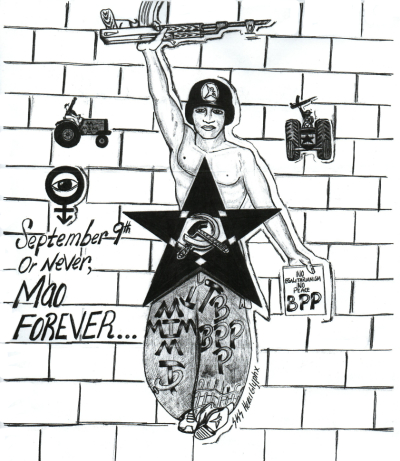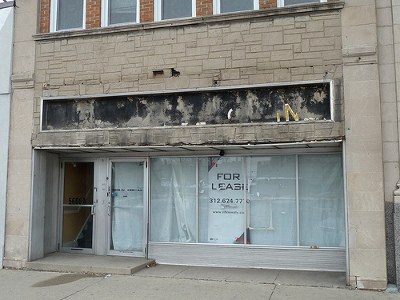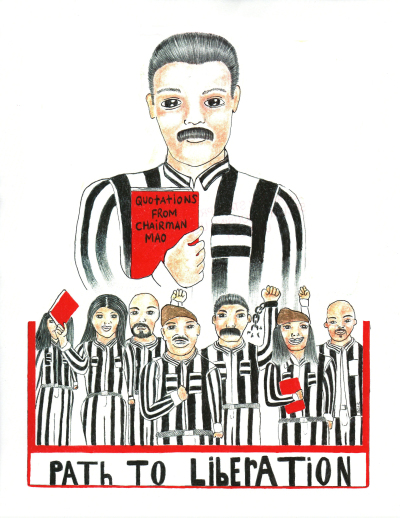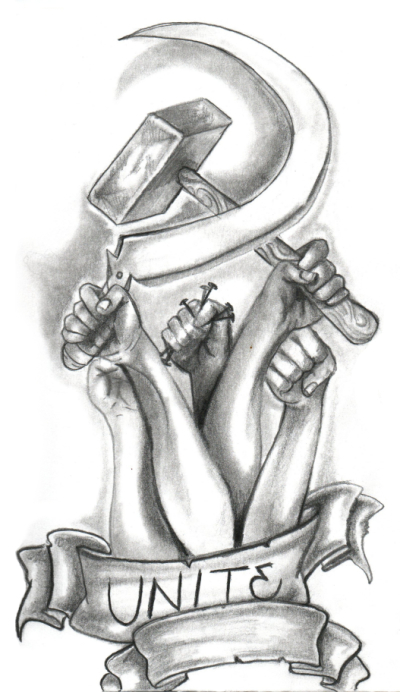
Fighting the Real Enemy on September 9 Solidarity Demonstration

September 9, 2016 will be the fifth annual Day of Peace and Solidarity demonstration in prisons across the United $tates. This is an opportunity for prisoners to commemorate the anniversary of the Attica uprising and draw attention to abuse of prisoners across the country through a 24-hour day of education and building peace, where some units will exercise a work stoppage and fast. The annual demonstration was initiated in 2012 by an organization in the United Front for Peace in Prisons (UFPP), and has been taken up as an annual UFPP event, with people participating all across the country.
This demonstration aligns with the UFPP principle to build unity among prisoners who have a common interest in fighting the oppression of the criminal injustice system. Prisoners are taking the 24 hours to engage in solidarity building and education, ceasing all prisoner-on-prisoner hostilities. This is a small, but meaningful step in building a United Front among prisoner organizations and individuals committed to the anti-imperialist movement. It is an opportunity to come together, publicize the UFPP and assess our progress. To stand in a united front, we do not need to agree on every political issue, but we must come together united around core principles to build and stand as one. The unity building starts well before September 9 for those who are engaging others to participate in the action. It is a long slow process of education and organizing to build the anti-imperialist movement.
We recently learned about another call to action for 9 September 2016, a “Call to Action Against Slavery in America”.(1) The people who issued this call wrote: “On September 9th of 2016, we will begin an action to shut down prisons all across this country. We will not only demand the end to prison slavery, we will end it ourselves by ceasing to be slaves.” This call for a country-wide work stoppage in prisons coincides with the UFPP solidarity demonstration and so we take this opportunity to comment on the similarities and differences.
First we want to say that we are always happy to see people taking up organizing and trying to build unity behind bars. There are some very good points taken in this call to action, particularly in the recognition of the growing protests in prisons across the country and the importance of this resistance. With our focus on building a United Front among prisoners we would hope to work with these folks to broaden our movement. We are not sure if the organizers were unaware of the work the UFPP has been doing on a September 9 protest for five years, or if they purposely decided to initiate a separate action due to disagreements with the UFPP. Our attempts to reach out to organizers have so far been unanswered.
Tactically, we are both promoting a commemoration of the Attica uprising, and a work strike might be included in some prisoners’ plans for the Day of Peace and Solidarity. While a one-day strike is more symbolic than anything, we do see power in the ability of prisoners to “shut down” facilities by not doing the work to keep them running for a potentially longer period. However, the organizers behind this more recent call are taking the work strike to the level of a line question, which we have strong disagreements with. They focus on a work strike because they are focused on abolishing what they see as “slavery” in U.$. prisons. However, for Marxists, slavery is a specific economic system that involves the ownership of people in order to exploit their labor. Slaves have exchange value, just like other objects that are bought and sold. This exchange value for people is the basis of a horrible system that involves the capture and purchase of humyns. People confuse prison labor with slavery because there are some significant similarities: prison labor does involve workers receiving very little or no pay, and like slaves prisoners are given housing, food and other basic necessities while held in captivity. But we can see clearly that there is no exchange value to prisoners because states must pay other states to take their prisoners. This is the opposite of slavery where people pay to buy slaves.
Further, in order to call prisoner labor slavery there must be exploitation. We can see that this exploitation (prisons actually profiting from prisoner labor) only exists for a tiny portion of U.$. prisoners.(2) States like Texas and Louisiana do have significant productive industries reminiscent of the slave days. But for most, this is not the reality. Prisons require huge infusions of federal and state funds in order to operate. If they were making a profit off of prisoners’ labor this drain on public funds would not be required. Instead prisoner labor is only offsetting a small portion of the operating cost.
Some people tell us this is just semantics, arguing about the definition of a term rather than talking about the very real problem of prisons torturing humyn beings while allowing the real criminals to run the government and capitalist corporations. But this recent call for protest against prison slavery underscores why these definitions are so important. The organizers of the September 9 protest against slavery wrote: “When we abolish slavery, they’ll lose much of their incentive to lock up our children, they’ll stop building traps to pull back those who they’ve released. When we remove the economic motive and grease of our forced labor from the US prison system, the entire structure of courts and police, of control and slave-catching must shift to accommodate us as humans, rather than slaves.” This statement is not true, and it ignores the economic reality of prisons which receive over $60 billion a year in state and federal funds to cover operating costs. Why would the government run a money losing business? Certainly not for economic gain!
The economic motive of slavery is not the driving force behind prisons. And even if we don’t call it slavery, economics are not the reason we have prisons. While it is true that lots of people get very high salaries, and many companies make buckets of money by serving the prison system, this is just a redistribution of profits taken from exploitation of Third World workers. That’s why it has to come from the government allocated to the prisons. And that $60 billion could be funneled into any other project that provides jobs for the Amerikan labor aristocracy just as easily and all those guards and other prison workers would be just as happy. Prisons are a convenient way to redistribute imperialist superprofits to the labor aristocracy within U.$. borders, but they are definitely not the best option if economics were the sole consideration.
It is critical that activists and revolutionaries understand that Amerika has built an enormous criminal injustice system as a tool of social control. Prisons are used to lock up oppressed nations and activists. The history of prisons in this country clearly demonstrates this. We saw a huge rise in incarceration starting in 1974 after the revolutionary movements of that time were targeted by the government. Until that time there was a relatively low and stable rate of imprisonment in this country. Then the lockup rate of First Nations, New Afrikans and Chican@s rose to vastly disproportionate numbers relative to whites starting in the 1970s. These historical events and economic facts make it clear that Amerikkkan prisons are used for social control, not for profits.
The organizers of the anti-slavery protest are misleading people into believing that shutting down prison work will shut down prisons. It will cause difficulties, and is a very valid tactic for exerting power as a group. But prisoner labor itself is not the principal contradiction in prison. We guarantee that if we were to reach the unity to wage an extended work strike across U.$. prisons, that Amerika would figure out how to keep the oppressed locked up.
We call this a failure to recognize the principal contradiction. In this case we are talking about the thing that will best push forward the prisoners’ fight against oppression. Fighting against something that doesn’t exist (slavery) is certainly not the best way forward. But even if we don’t call it slavery, fighting against prisoner labor as if the end to prisoner work will put an end to prisons is also incorrect, and will lead to a dead end. We see the need for unity among prisoner groups and individuals as critical to building a solid anti-imperialist prison movement. We think this addresses the real principal contradiction that the prison movement faces between the collective interests of the imprisoned lumpen and the individualist tendencies currently dominant among that class. This is why we organize on September 9 to build a Day of Peace and Solidarity. Get involved! Write to us for the September 9 Organizing Pack and get started building in your prison.










